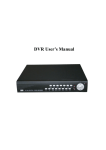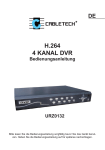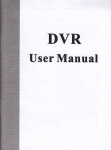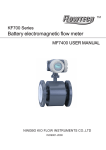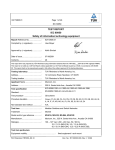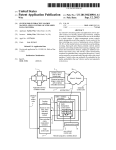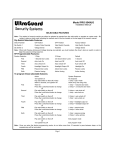Download H.264 4CH DVR User manual
Transcript
EN H.264 4CH DVR User manual URZ0132 Please read this instruction thoroughly before operation and retail it for future reference. Owner’s manual ITEM Chapter 1: Product description.........................................................................................................4 1.1 product overview................................................................................................................... 4 1.2 technical parameters...............................................................................................................4 Chapter 2: Instruction of product appearance struct........................................................................5 2.1 panel instructions....................................................................................................................5 2.2 product port instructions..........................................................................................................6 2.3 remote control instructions......................................................................................................7 2.4 video format............................................................................................................................8 Chapter 3: Operating system instructions........................................................................................8 3.1 start/shutdown........................................................................................................................8 3.2 previwes..................................................................................................................................9 3.3 basic operation instructions of menu......................................................................................9 3.3.1 enter menu mode...............................................................................................................9 3.3.2 composite instructions of menu........................................................................................11 3.3.3 exit menu mode..............................................................................................................11 3.4 main menu introduction........................................................................................................12 3.5 video playback......................................................................................................................13 3.5.1 file search........................................................................................................................13 3.5.2 search result....................................................................................................................14 3.5.3 playback tools control......................................................................................................15 3.6 manual record.......................................................................................................................16 3.7 PTZ control...........................................................................................................................17 3.8 menu.....................................................................................................................................17 3.8.1 management tools..........................................................................................................18 3.8.2 system settings...............................................................................................................22 3.9 log information......................................................................................................................34 3.10 shutdown the system..........................................................................................................35 Chapter 4: Client operation instructions.........................................................................................36 4.1 main page of video monitor...................................................................................................37 4.2 code stream selection...........................................................................................................37 4.3 PTZ control...........................................................................................................................37 4.4 highly setting box..................................................................................................................38 4.5 highly setting box..................................................................................................................38 4.6 configuration.........................................................................................................................38 4.6.1 server parameters configuration.....................................................................................38 4.6.2 channel parameters configuration..................................................................................39 4.6.3 alarm parameters configuration......................................................................................40 4.6.4 user configuration information.............................................................................................40 4.6.5 other................................................................................................................................41 4.7 remote playback....................................................................................................................42 3 Owner’s manual Chapter 1 Product description 1.1 Product overview The equipment is a security surveillance product which is designed specifically for the security field, which adopts embedded processor and embedded operating systems, combined with latest technologies in the IT field, such as video and audio compression / decompression, high-capacity hard disk recording, TCP / IP network technoIogy, and the codes are solidated in the FLASH, which makes system run more stable. The equipment at the same has the fearture of digital video and audio recorder (DVR) and digital video and audio server (DVS), which can not only independently locally, but also orm a powerful network of security monitoring through being connected to network, it can be used in banks, telecommunications, power, justice, transport, residence, factories, warehouses. water conservancy facilities and other fields and the safety precautions of each departments. 1.2 Technical parameters 4 Model TR-008-4HV Operating system Embedded Linux operating system System resources at the same time 4-channel CIF real-time video and network transmission, 1 or 4-channel CIF playback and 8-channel CIF / QCIF sub-stream Operation interface graphical operation interface, which supports mouse, panel, remote control Video standard PAL, NTSC Video compression H.264 Audio compression ADPCM Video modes manually, timing, alarm, motion detection Video query timesearch, event search, channel search, log search Backup modes network backup, USB backup, SATA DVD Video input 4-channel BNC VGA output 1-way BNC, 1-way video output Audio input 4-channel BNC Audio output 1 channel BNC Monitor quality PAL: 720x576 (D1); NTSC: 720x480 (D1) Playback quality PAL: 720x576 (D1); NTSC: 720x480 (D1) Image control 6-speed adjustable Motion detection the detection area of each channel (16x16), which can be set multi-level sensitivity Screen display 1, 4, screen display Owner’s manual Video state PAL: 25 frames / sec (adjustable) NTSC: 30 frames / sec (adjustable) Save video the hard drive, network Local playback 1 or 4-way playback at the same time Alarm input 4 switch input Alarm output 1 switch output PTZ control RS485 Hard disk interface 2 sata interface Network interface RJ45 10M/100M self-adapted Ethernet port USB interface USB 2.0 high-speed interface, USB 1.1 interface Power 12V, 3A Chapter 2: Introduction of product appearance struct 2.1 Panel description 1. CH2. CH+ 3. QUAD 4. MENU 5. ESC 6. REC 7. PLAY/PAUSE 8. STOP 9. REW 10. FWD 11. Left 12. Down 13. Right 14. Up 15. OK 16. Start indicator 17. Record indicator 18. Power LED 19. Infrared receiver window 20. PTZ 5 Owner’s manual Interface part of the key Mouse: USB1.1 interface is used for the mouse to connect. CH- & CH+: video channel control keys, which are used to switch the current video channel Up, Down, Left, Right: Move control keys,which is used for the movement and choice of menu control Enter: confirm button, which is used to confirm the selected items Menu: it’s used to transfer out of the system menu Esc: Return or cancel Quad: split screen mode switch Rec: Open the manual recording page Play: Open the playback page Ptz: Open Cloud-Mirror Control Page Light-hole part Power: power indicator, bright when power-on, green HDD: hard disk light, bright when hard disk is working RUN: Running lights, bright when hard disk is running IR: remote control receiver,which is used to receive remote device commands 2.2 Product Interface Description V1-V7: video input port, which is used to receive the video signal source VIDEO OUT: it‘s used for video AV output, which can directly be connected to TV or the Monitor AUDIO OUT: Audio output, connect Speaker MIC: it‘s used audio signal input, such as microphone and the like. AUDIO IN: it‘s used audio signal input, such as microphone and the like. VGA: it‘s used for video VGA output and display connection IO IN: it‘s used for alarm input connections ,connect devices such as alarm probe IO OUT: it‘s used for alarm output connections ,connect devices such as alarm RS485: it‘s used for the RS485 bus to transceiver devices, such as PTZ decoder RJ45: the network port, connect the device to the network DC IN: Power Interface, please use the distribution power connections,do not use other power supply, othenrwise it might burn equipment 6 Owner’s manual 2.3 Remote control description 1-9 Channel select 1-9 0 Number ALL Display all channels Menu Enter or exit menu Move up Move down OK Select/modify item Rewind Play/pause Fast forward REC Record Stop recording/playback Mute ESC Exit PTZ PTZ control mode FOCUS+ Focus + FOCUS- Focus - IRIS+ Iris + IRIS- Iris - ZOOM+ Zoom + ZOOM- Zoom - Remote control mode is the same as the panel. 7 Owner’s manual DEV button: after pressing DEV key, according to the number keys enter device number which is agreement with the host, press „OK” button to save the settings. Then operation of the device takes into force. SHIFT: the current version does not support the key. CLEAR: when setting covering and mootion detection region, clear the current constituency. Note: when there are more than one device in the same place, remote control firstly must according to device number select a piece of equipment, so defining a unique device number for each device is a must, or remote control operation may at the same time make effect to more than one device, which has the same device number. 2.4 Video format In the video format switches on the device motherboard, perform video format settings. PAL format status: NTSC format status: Chapter 3: Operating system instructions 3.1 On / off Confirm that swith-in current and voltage is consistent with the hard disk recorder which meets requirements, and ensure that middle power outlet of the hard disk recorder is well grounded. After access to power, the device starts [POWER] light which is green, and after entering the system, the panel RUN light normally flashes. Long-press [POWER] key for 5 seconds to make the machine soft-off, and the light is red, then again press [POWER] to restart. 8 Owner’s manual 3.2 Preview After normal equipment boot,immediateIy enter the preview screen. In the preview screen you can see date, time, channel name of the system.Press number key corresponding to panel or click the left mouse button, you can preview a single image; then press Panel „Quard” button or click the left mouse button, you can return to a multi-screen preview status. 3.3 Basic operating instructions menu 3.3.1 enter the menu mode [Main Menu / MENU] key to enter the device‘s main menu interface. 9 Owner’s manual [PLAY] shortcut keys, enter playback interface. [VIDEO/REC] shortcut keys, enter manually recording interface. [PTZ] shortcut keys, enter PTZ control interface. 10 Owner’s manual 3.3.2 menu composition description Menu component units mainly consist ofthe following categories: (1) box: provide two kinds of status options, „ ” means effective, „ ” means ineffective, use [confirm/ENTER] key or [ ] , [ ] key or click the left mouse button to choose. For example: in the file search menu page, the „Select Channel” page and the „video type” check box. (2) selection box: According to the options contents of the system drop-down box, select the target content. Use [ ], [ ] key or click the left mouse button to select. For example: in the file search menu page, the „Storage Device”’ selection box. (3) list box: query results information display in the list, you can select one of the operation in the provided list to operate accordingly. For example: in the list of playback query resuIts, press [confirm / ENTER] key or the left mouse button to play the file; you can use the right mouse button to select / cancel the video file in order to easily backup video files. (4) edit box: through the edit box, enter the target name. For example: in the System Configuration menu page, the „device name” edit box, enter numbers, English letters, Chinese and so on. a) through the [FN] key or in the , click the left mouse button to switch input types, including numbers, case letters, punctuation marks, Chinese input method. b) through the panel [ ], [ ] key or the mouse cursor mobilely positioning location of the edit box, press „ENTER” key or click the left mouse button, then the enter keyboard appears, through the arrow keys or clicking the left mouse button to select the target characters which need to be entered. c) by [SHIFGT] key or click the right mouse button to delete the character before the cursor. d) After entering, press [MENU] key or [ESC] key to exit edit status. (5) button: it‘s used to perform a specific function or enter the next one setting menu, press [confirm / ENTER] key and the left mouse button to determine access. 3.3.3 Exit Menu mode Press [MENU] , [Exit / ESC] or the right mouse button to exit the menu mode and switch to a muIti-screen preview mode. Click the right mouse button, return to the previous menu level. 11 Owner’s manual 3.4 Main menu introduction Press MENU key or the right mouse button to pop-up the main menu, main menu consists of the following three components: Preview mode: in the menu coIumn, you can select the corresponding screen preview mode. Shortcut menu: in the menu column, respectively have: video playback, manual recording, shortcut menu of PTZ control, you can directly enter the corresponding menu pages. The main menu bar: after clicking to enter, incIude: management tools, system settings, log query, shut down the system of the menu page and so on . 12 Owner’s manual 3.5 Video playback Click „video playback” of the main menu column, enter file search interface. 3.5.1 File search Select channel: Select the target channel you want to search, click the check box to choose. Video Type: Select the video type which needs to search. „ ” means to be checked; „ ” means not to be selected. Time setting: in the edit box enter the beginning and end time to search the video. Storage device: in the selection box select the target backup storage device. Search files button: after setting the search criteria, click the button, then the system begins to search the corresponding video files, and enter the search results interface. NOTE: If video files meeting the search criteria are more than 4000, then the system only shows the latest 4000 video files. If you want to find the updated files, please modify the search criteria. Playback By time: According to set starting and ending time to start playback of video material. (No distinction of video types) playback tools control, please refer to 3.5.3. By time backup: Backup all video data to the designated storage devices during the set beginning and ending time. 13 Owner’s manual 3.5.2 Search results After setting search criteria, click „File Search” button, then enter the search results interface. Playback video files: in the search results list box, through the upper and lower key or moving the mouse to position the target file, click the „ENTER” key or left mouse button to start playing the file. 14 Owner’s manual Backup: In the search results list, through the upper and lower key moving the mouse to target file, and then use the FN key or the right mouse button to select the file, in the storage equipment selection box, select the target storage devices, and then click „Backup” button, then the selected video file will be backed up to the target storage device. Cancel button: return to the previous menu level. 3.5.3 Playback tool control When selecting the file playback or playback by time, it will enter the video playback interface. Playback toolbar: In the bottom of playback interface, pIayback toolbar will appear, and you can click the right mouse button to hide / show toolbar. When at the same time Multi-screen is being playback, after hiding tool bar, you may by clicking the left mouse button zoon in or out corresponding channel video. Stop Play: Click Pause / Play: Click button, the system will stop playing and exit the playback interface. button to pause playback, click SingIe·frame playback: when it is pause mode, click time click to forward play one. Slow play: Click Quick play: Click to continue to video playback. it will be single-frame playback, and each to slow play, click again to set the slow-play multiples. to quick play, click again to carry out quick-play multiple settings. Previous paragraph / next paragraph: Click or button, every time click once of a time or the next section, playback progress will forward or backward progress 10%. 15 Owner’s manual Close / Open Sound: click or can open or close the sound of playback files. Playback status information: on the right playback tool bar respectively show: playback speed, play progress, the played time, total time of video file. to exit playback screen at any time; after playing aIl, Exit Play: Click „ESC” key or buttons automaticaIly quit the playback screen. 3.6 Manual recording Click the „manual recording” in the main menu column to enter its settings interface. [Video / REC] key or in the main menu column, use mouse to click „Manual recording” to directly enter manually setting recording interface. Manual video interface description Manual recording interface consists of the following components: Channel number: it corresponds to the video channel of the device. Channel status: it indicates video status of the corresponding channel, and status lights are green, and indicates that no open video; red means to open the video. Video status: when the state lights are surrounded by a coil of ding channel open the network video transmission. , and means the correspon- When the system is in recording state (regardless of video type), in the lower left corner of the channel preview screen will show which means the system is recording. 16 Owner’s manual Full enable / disable the button: Click the button to stop or open the video settings of all channels. Back button: Click the back button, then exit manual recording interface, return to the main menu bar. Note: Manually start the video, only through the manually stopping, otherwise the video would continue. 3.7 PTZ control Click „PTZ control” of in the the main menu column to enter setting interface. The main operations of PTZ control are: directional control; horizontal sweep; zoom control; adjust the focal length; adjust aperture; PTZ speed. After switching page, you can call the preset points; start / stop automatic cruise; wiper control; lighting control; auxiliary equipment control. Description: The called preset points must be set up, and for the cruising path setting method see 3.8.2.8 PTZ settings, in which when the set cruise path number is less than 2 digits, you need to add 0 to make up enough numbers before the value of the set corresponding cruise path number. 3.8 Menu Click „menu” in the main menu column to enter the main menu page, and one-level menu includs: management tools, system settings, log Query, shut down the system. 17 Owner’s manual 3.8.1 Management Tools It includs hard disk management, user management, restore to the default, clear the alarm, software upgrades, time settings, version information. 3.8.1 Hard disk management SATA: It displays hard disk information of the current system, „o” means the success of the hard disk test; „X” indicates means not to detect the hard disk. Hard Format: In the hard disk select box, select the target disk, and you can view the information corresponding to the hard disk, click „Format” button to turn up a confirmation page, click „OK” button to begin formatting the hard disk; after the hard disk format is completed, the hard disk can be used normally. Note: before the hard disk formatting, stop all recording. 18 Owner’s manual 3.8.1.2 User management Create and add users, delete users and modify user information (the users except Admin have no rights to set up additional user rights). Create a new user Enter the „User Management” interface, click the „Add” button t0 enter adding user interface. 1. Enter the new user name In the User Name edit box, enter a new user name (such as the user). Note: for input methods, see 3.3.2 (4) edit box. 19 Owner’s manual 2. Set the new user’s password In the „Add User” interface, select „Set Password” button, enter the password setting page, and directly enter the new password, which is less than six figures. 3. Setting up new user’s permissions In the „Add User” interface, set the new operating authority for the user, within the box of the corresponding function to choose, and „ ” means that the user can use the permission, „ ” means that the user can not use the permission. 4. Save the new user‘s settings Click „Confirm” button to set the new user information to save, and „CanceI” means not to save. Modify user Enter the „User Management” interface, in the user list, click the right mouse button or panel „ENTER” key to select the target user, and then click „Modlfy” button, enter the „Modify User” page to modify user information. Notes: admin administrator can modify permissions of other users. Delete User Enter the „User Management” interface, in the user list, click the right mouse button or panel „ENTER” key to select the target user, click the “delete” button, and after confirmation delete the user. 3.8.1.3 Restore Default Restore the system configuration parameters as the factory configuration, and after restore, the system restarts automatically. 3.8.1.4 Clear alarm Manually remove all of the alarm information. After the successful removal of alarm, the system will give prompt information of „has successfully cleared warning”. 20 Owner’s manual After confirmation, return to management tools the page. 3.8.1.5 Software upgrade In the management tools interface, select „software upgrade” to enter its operation interface. In the upgrade option box, select objectives which need to upgrade; in the upgrade option box, select the upgrade mode: FTP, or USB. USB Upgrade: copy the upgrade files to the root directory of U disk, plug U disk, and then click OK to upgrade the system. FTP Upgrade: put the upgrade file into the root directory of FTP server’s, and set the server IP address as the specified address, and finally click OK to upgrade the system. After upgrade, the system will automatically restart. NOTE: Motherboard upgrade file name must be: mainboard.bin; Panel upgrade file name must be: panel.Bin When system is being upgraded, don‘t disconnect the power supply, so as to avoid equipment failure. 21 Owner’s manual 3.8.1.6 Time setting Enter date and time page, in the „Date”, „time” edit box respectively enter the exact date and time, ccntirm the save,and cancel to exit. 3.8.1.7 Version You can see the device name, model, related information of version number. 3.8.2 System settings In the main menu page, select „System Settings” to enter its sub-menu interface. 22 Owner’s manual 3.8.2.1 System configuration In the System Settings interface, select „System Configuration” to enter the setting interface. Device number: When using the remote control to remote and control operate equipment which must be through the device number communicating with the remote controI, the remote control must correspond to the device number to achieve remote operation. For the settings of remote control device number, see the 2.3 instructions. Equipment name: device name is generally defined as the regional name of control points, and when remote access, you can intuitively find the monitoring point what you want to access. The default device name is „NetDVR”. For editing method, see 3.3.2 (4) edit box. 23 Owner’s manual Equipment expiration: When selecting „coverage”,and when the hard disk inside the device are all fully recorded, the system covers the first video data, to achieve the purpose of circulating the video. Keyboard lock time: the system has no operation during the set keyboard lock time, then the system will automatically log off the current user, and itneeds to re-sign-on system to operate. Switching time: switching time is cycle time period of single-channel preview display. Video format: The device supports PAL and NTSC video output formats. The default output format is „PAL”. For setting method please refer to 2.4. VGA resolution: the user can adjust the VGA display resolution according to VGA monitors. Menu transparency: After entering the user operation interface, you can by adjusting the level of menu transparency to achieve the transparency between the preview screen and menu. Language: According to the needs of users, you can set the menu language type, select Simplified Chinese, English. Status display: in the preview screen, set whether to display video mode, status, and open the information icon of motion detection, which is marked as „ ” to show state; it’s marked „ ” as nondisplay status. lcon status description in the lower left corner of pannel preview screen: - indicates that the system is recording video (regardless of video type). - indicates timing recording status. - means the manual recording status. - means motion detection status - means motion detection recording After the page setting is completed, click „OK” button, the settings are saved and exit; click „CanceI” button, the setting information is not saved and exit. 3.8.2.2 Video Settings In the System Settings interface, select „Video Settings” to enter the settings interface. 24 Owner’s manual Select channel: Select the target channel you want to set, click the select box to select. Stream: Select the code stream which needs to set, which are respectively „main stream” and „sub-stream.” Stream type: Select the needed video stream type, and „video streaming” means only to encode the video when the system is recording video; „composite flow” means to encode audio and video at the same time when system is recording. Bit rate type: Users can set „fixed rate” and „variable bit-rate”, and „fixed rate” means the system encodes images according to bit rate and video frame rate which the user sets; „variable bit-rate” means the system encodes images according to image quality and video frame rate which the user sets, but the bit rate is that the system automatically adjust according to the video scene. Bit rate: the bit rate which users select to encode according to need. The higher the bitrate, the better the image, but the occupied disk space is larger. Video frame rate: the video frame rate which users select to encode according to need. The higher the frame rate, the better the image smooth, but the occupied disk space is larger. Copy to: In the select box on the right of Copy To button, select the target channel, click the „copy to” button, and the system will apply the current channel setting information to other target video channel. When the page setup is completed, click „OK” button,then the settings are saved and exit; click „Cance|” button, then the setting information is not saved and exit. 25 Owner’s manual 3.8.2.3 Image settings In the System Settings interface, select „Image Settings” to enter the settings interface. Select channel: Select the channel you want to set, click the select box to select. Channel Name: In the edit box, the user own can edit the channel names. For the edit method, see 3.3.2 (4) edit box. Display name: „ ” means display, „ ” means not to display. Click „Location” button to enter the setting interface,you can via panel keys or the mouse dragging the red channel name to set, and after set-up, press „ENTER“ key or right mouse button to save and exit, press „ESC” key not to save and exit. Image parameters: Respectively configure the brightness, contrast, hue and saturation of channel image, use the panel [ ], [ ] keys or the mouse to drag scroll to adjust. Use the default values: By clicking the button, you can restore the setting image parameters to the system default value (only limited to restore the image parameters). Cover: in the „cover” option tag set „ ”, thereby active button of the cover „regional” to confirm to enter cover region setting interface. Set cover region: In the setting interface of cover region,a small yellow box appears in the regional center, that is the cover setting box. The creation of the region: through the panel arrow keys moving the yellow box to the beginning position of the established region, press [FN] key to (yellow box switches to the red box each other) turn it into a red box (red box is the cover region box which takes into force); and then press the arrow keys to adjust the size of the region, and the minimum can be set to a small square ,and the maxium can be set up to four cover areas. Click the left mouse button or long-press left button to move the mouse to select area, and after selection,you can press „ENTER” key or click the middle button of mouse to exit and save, „ESC” key not to save and exit. 26 Owner’s manual Partial elimination: mave the yellow box to the start region which need to be eIiminated (upper left), press [FN] key to enter a small black box (to eliminate the regional boxes) and the localized area is eliminated. After elimination, press [confirm / ENTER] key to save and exit, and if you press [exit / ESC] key, the elimination operation is invalid. In the red box, click the left mouse button or Iong-press left key to move mouse to eliminate area, click the middle button of mouse to exit and save. Clear All; Press [MENU] to clear all covered areas of the channel. Copy to: In select box on the right of the Copy To button, select the target channel, click the „Copy to” button, and the system will apply the current channel setting information to other target video channel. Note: Channel names can not be copied. After the page setup is completed, click „OK” button, the settings are saved and exit; click „Cancel” button, the information is not saved and exit. 3.8.2.4 Alarm input In the System Settings interface, select „Alarm Input” to enter its settings interface. Input channel: Select the channel you want to set, click select box to choose. Alarm type: you can set high, low voltage, please select the appropriate level for the alarm corresponding to alarm input channel connection. Detection: you can set whether to test alarm input signal. Select „Yes” then the following setting functions take into force; „No” means not to do any treatment. PTZ linkage: Click the „Settings” button to enter PTZ linkage settings interface. Select a channel number, and perform the relevant settings of PTZ linkage: preset point, cruise, trajectory. For PTZ setting methods, see 3.8.2.8. 27 Owner’s manual Delay: When alarm input ends, the setting needs the extension of time of various treatment. Buzzer: Whether to trigger the alarm buzzer. „ ” means enable, „ ” means invalid. Video channel: When setting alarm input, you need to trigger the specified video channel number. Alarm output: When setting alarm input, you need to trigger the specified alarm output channel number. Copy to: In the select box on the right of Copy To button, select the target channel, click the „Copy to” button, and the system will apply the current channel setting information to other target video channel. After the page setup is completed, click „OK” button, the setting information is saved and exit; click „Cancel” button, he setting information is not saved and exit. 3.8.2.5 Alarm output In the System Settings interface, select „AIarm output” to enter its settings interface. Output channel: Select the target channel you want to set, click select box to choose. Alarm type: „Normal close-type” and „always open-type” seIect corresponding type. Time period: „ ” enable valid time settings of alarm output, and only during the effective setting period, alarm signal can be exported. After the page setup is completed, click „OK” button, the setting information is saved and exit; click „CanceI” button, he setting information is not saved and exit. 28 Owner’s manual 3.8.2.6 video deployment In the System Settings interface, select „Video deployment” to enter its settings interface. Select channel: Select the channel you want to set goals, click the select box to select. Weeks: Select which day you want to set, and you can set it separately; „AlI” means all dates. Video types and time periods: during the four time periods,you can set different video types during each period, timing video (red), motion detection recording (green), alarm recording (yellow). „ ” means enable; „ ” means invalid. There is time period status displaying below, and the overall schedule from 0 to 24 hours. Copy to: In the select box on the right of Copy To button, select the target channel, click the „Copy to” button, and the system will apply the current channel setting information to other target video channel. After the page setup is completed, click „OK” button,the setting information is saved and exit; click „Cancel” button, he setting information is not saved and exit. 3.8.2.7 Video Detection In the System Settings interface, select „Video Detection” to enter its settings interface. 29 Owner’s manual Select channel: Select the target channel you want to set, click the select box to select. Type: you can select motion detection, video loss. Video channel: Select the specified alarm output channel number which needs to trigger after detection occurred. Alarm output: Select the specified video channel number which needs to trigger after detection occurred. Buzzer: Whether to trigger the alarm buzzer. „ ” means enable, „ ” means invalid. Delay: When alarm input ends, the setting needs the extension of time of various treatment. Area: Set motion detection area, and the setting methods , see 3.8.2.3 setting cover region. Sensitivity: Select to trigger motion detection sensitivity. „No detection” means the above set parameters are invalid. Copy to: In the select box on the right of Copy To button, select the target channel, click the „Copy to” button, and the system will apply the current channel setting information to other target video channel. After the page setup is completed, click „OK” button,the setting information is saved and exit; click „CanceI” button, the setting information is not saved and exit. 30 Owner’s manual 3.8.2.8 PTZ settings In the System Settings interface, select „PTZ Settings” to enter the settings interface. Select channel: Select the target channel you want to set, click the select box to select. Rate: Select the rate which matches the connected PTZ. Data Bits: Select the data bits which match the connected PTZ. Stop Bits: Select the stop bit which matches the connected PTZ. Checksum: Select the check value which matches the connected PTZ. Flow control: The selected item must be consistent with the matched PTZ flow control settings. Protocol type: The selected item must be consistent with the matched PTZ protocol. Decoder address: Enter the address of the specified decoder. Preset point setting: preset point is to preset and memory position, focal length, aperture and zoom of camera, while using a number to mark these settings. Add a preset point: In the pre-edit box enter a preset point,the range of which is 1-128, and then through the arrow keys to adjust the distance from the camera to the target location, and after adjustment, press setting, and the preset point is „saved”. Delete preset point: In the edit box enter a preset point which you want to delete, select „DeIete.” The cruise path setting number: cruise path is a path on which the camer runs at a certain speed, by passing more than a cruise points which have serial numbers,and each cruise point includes preset stop points and stop time, so the cruise path settings includes the settings of cruise point, preset point, stop time. Cruising speed and other parameters, and in the „settings” interface you can set he appropriate information. At present, a piece of equipment supports 16 cruise path number settings. 31 Owner’s manual Track settings: track is a irregular movement line which camer pre-defines, and enter „settings” you can set the trajectory. Copy to: ln the select box on the right of Copy To button, select the target channel, click the „Copy to” button, and the system will apply the current channel setting information to other target video channel. After the page setup is completed, click „OK” button,the setting information is saved and exit; click „Cance|” button, the setting information is not saved and exit. 3.8.2.9 Network settings In the System Settings interface, select „Network Settings” to enter the settings interface, which respectively includes the „Ethernet, PPPOE, DDNS” configuration. Ethernet contiguration: In the network configuration interface, select the „Ethernet Configuration” to enter its settings interface. 32 Owner’s manual Physical Address: It displays the physical address number of the device. Port number: The port number must be greater or equal to 2000. IP address: The IP address must be unique and can not conflict with any other host or workstation on the same network . Subnet mask: It’s used to divide the network segment. Default gateway: It’s used to achieve communication among the different network segments, which needs to set the gateway address. DNS address: The device uses PPPoE protocol to access network, and it will get a dynamic IP address. Enable multicast: Select whether to enable multicast. DHCP: Select whether to enable DHCP to automatically obtain IP. Http port: The port number which IE is browsering to visit, and the default port number is 80. When the page setup is completed, click „OK” button, and the setting information is saved and exit; cIick „CanceI” button, the setting information is not saved and exit. PPPOE configuration: In the network configuration interface, select the „PPPOE Configuration” to enter its settings interface. 33 Owner’s manual Enable: „ ” means to enable PPPoE to diaI-up, „ ” means not to enable the feature. The user name and password: In the edit box enter the user name and password which the ISP provides. For editing method, see 3.3.2 (4) edit box. When the page setup is completed, click „OK” button, the setting information is saved and exit; click „CanceI” button, the setting information is not saved and exit. DDNS configuration: In the network configuration interface, select the „DDNS Configuration” to enter its settings interface. Enable: „ ” means to enable DDNS Dynamic Domain Name Service, „ ” means not to enable the feature. Select the corresponding service providers, and in the edit box enter the user name, password and domain name. For editing method, see 3.3.2 (4) edit box. When the page setup is completed, click “OK” button, the setting information is saved and exit; click „CanceI” button,the setting information is not saved and exit. 3.9 Log information In the main menu page, select „Log query” to enter its interface. 34 Owner’s manual Main types: in the selection box select query log types. Time setting: in the edit box enter the view time period. Click the „Search Logs” button, and the corresponding log information will appear at the bottom of the log list. You can through in the Page box entering the target page, click „OK” button to curl, or scroll the middle mouse button to curl. 3.10 Shutdown the system In the main menu interface, select „shutdown system” to enter its interface. In the selection box, select corresponding operation content. Cancel the user: It’s user to exit the current user. After cancelling, if you want to continue to use the equipment, you need to re-login the system. Restart: Restart the device, and after confirmation the device will restart. Close system: Close the device, and after confirmation the device will be closed. 35 Owner’s manual Chapter 4: Client operation instructions When the PC is using the client, you should do the following settings: 1. The IE settings: if the first time you use it, and the control does not be loaded, you need do settings for IE as follows: Internet Options -> „safe-internet-> Custom Options -> ActiveX controls and plug-ins are all chosen to enable and finally Click OK. The following figure: Login: Open IE and in the address bar, enterthe IP address which is set in the host network settings (the factory IP address is http://‘l92.168.1.23), enter the login page, such as the following picture. Enter the user name and login password, the user name and password are the same as that of the host side, and enter the correct user information, then you can successfully login. If plugin is not installed automatically, please download the package and install it manually. 36 Owner’s manual 4.1 Video Surveillance Main Page After login, monitoring main page consists of preview window, PTZ control, preview mode, stream selection, channel open, opening the intercom, contiguration, playback, user cancellation form. Figure 4-1. Open preview: In the preview window, click the left mouse button to select the target channel (channel which displays as a red box means to be selected), and in the open box, use mouse to double click the channel number, which can open or close video image of the preview window of the corresponding to means to open; means close status. Preview mode: In the preview mode switching box, you can through mouse clicking or double-click the preview window to switch to a single picture or multiple pictures preview mode. 4.2 Bit stream selection The device supports dual-stream, and in the bit stream select box select a video preview stream type. 4.3 PTZ control [Direction buttons] - PTZ direction control button, you can press up and down, left and right to control the direction of PTZ operation. [Aparature] - aperture button, you can increase and reduce the control PTZ aperture. [Focus] - focal length button, you can adjust nearer or farther to control PTZ focus. 37 Owner’s manual [Zoom] - location button, you can pull nearer or farther to control the location of PTZ. 4.4 Advanced settings box When preview window closes the video preview, the feature is activated. In the corresponding channel preview window, click the right mouse button to open the Advanced Settings box: Open / Close sound: Through the button open or close the audio of previewing the channel. Capture: Capture the current video screen and save it as image formats. For saving the directory settings, see 4.6.5 Video Capture save directory. Video: Turn on remote recording of the channel video and save it. For saving the directory settings, see 1.5.5 Video Capture save directory. PTZ settings: lt’s used to set PTZ preset point, the cruise path, trajectory settings. For setting method, see 3.8.2.8 PTZ host side settings. OSD setting: Set the channel, time, real location of OSD layer, use mouse to drag location to confirm and save. Motion detection: Set motion detection area: firstly „ ” means motion detection area, select „Add area”, hold down the left mouse button to drag on the screen, then grid-like white line appears, which is detection area; select „clear the area”, in the region of the grid-like white lines, hold down the left mouse button to drag on the screen, then the region of the grid-like white lines disappears, and the motion detection area is cancelled. In the sensitivity and output delay box, select the corresponding parameters. Screen adjustment: Set the image brightness, contrast, hue, saturation, and click the left mouse button or drag to adjust, when exiting it is automatically saved. 4.5 Intercom control Click to open the Voice to initiately perform voice intercom. This version doesn’t temporarily support voice intercom 4.6 Configuration 4.6.1 Server parameter configuration 38 Owner’s manual In the setting interface, respectively set the related parameters settings to the host-side. In Figure 4-6-1. The setting parameters is the same as that of the host. For the setting methods and considerations, please refer to system configuration, system information, network operating instructions of the host. 4.6.2 Channel parameters configuration In the setting interface, respectively set the related parameters settings to the host-side. In Figure 4-6-2. The setting parameters is the same as that of the host. For the setting methods and considerations, please refer to image settings, video settings, PTZ setup instructions of the host. 39 Owner’s manual 4.6.3 Alarm configuration parameters In the setting interface, respectively set the related parameters settings to the host-side. In Figure 4-6-3. The setting parameters is the same as that of the host. For the setting methods and considerations, please refer to alarm input, alarm output and setting instructions ofthe host. 4.6.4 User configuration information 40 Owner’s manual Set the user information of the device, and the setting parameters are the same as that of the host. For the setting methods and considerations, please refer to user management instructions of the host. 4.6.5 Others In the setting interface, respectively set the related parameters settings to the host-side. In Figure 4-6-5. The setting parameters is the same as that of the host. For the setting methods and considerations, please refer to manual recording, date, time, hard disk management, clear the alarm, log query, software upgrade, restoring the default, turning off the system set-up instructions of the host. Record and capture image to save the directory: preserving path of setting path and capturing video. 41 Owner’s manual 4.6.6 Remote playback Select video playback channel number, the recording type and time conditions, click the Search button, then the left border will show the search result list. You can scroll the page from top to bottom or enter the page number to jump to view the video file (a file display 20 pieces of information, and up to 4000). File playback: in the search list box, select the target file, doubIe-cIick the file or click the „File PIayback” button, then the right playback window starts to play the target tlIe, and the playback control is the same as that of the host. Timing playback: Click „Time PIayback” button, then the playback window will start playing the video file ofthe start time which have been set. Download: In the search list box, select the target file, click „FiIe Download” button, and after setting the preserving path, it starts to download the target file. The lower progress bar shows the progress and status of downloading the file. 42 www.cabletech.pl













































